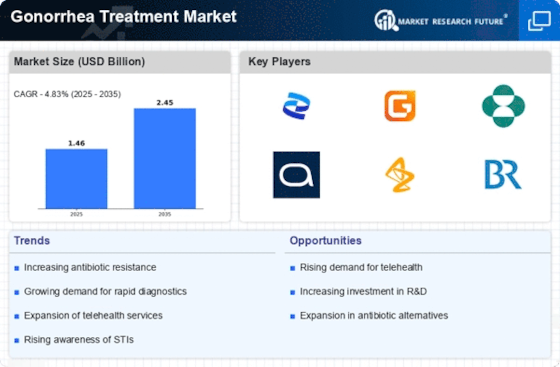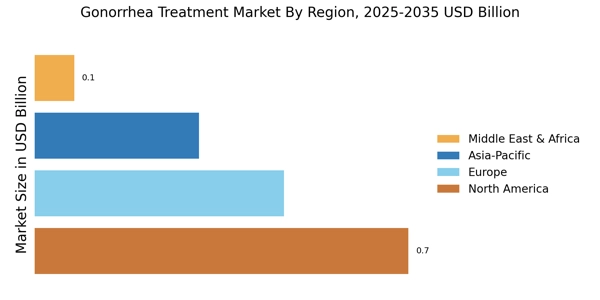Increasing Incidence of Gonorrhea
The Gonorrhea Treatment Market is experiencing a notable surge in the incidence of gonorrhea infections. According to recent data, the World Health Organization reports that there are approximately 87 million new cases of gonorrhea each year. This rising trend is attributed to various factors, including changes in sexual behavior and reduced condom usage. As the prevalence of this sexually transmitted infection escalates, the demand for effective treatment options intensifies. Healthcare providers are compelled to seek innovative therapies to combat this growing public health concern. Consequently, pharmaceutical companies are investing in research and development to introduce new antibiotics and treatment regimens, thereby driving growth in the Gonorrhea Treatment Market.
Emergence of Novel Therapeutic Options
The Gonorrhea Treatment Market is witnessing the emergence of novel therapeutic options as a response to the growing challenge of antibiotic resistance. With traditional antibiotics becoming less effective against resistant strains of gonorrhea, pharmaceutical companies are exploring alternative treatment modalities. This includes the development of new classes of antibiotics and combination therapies that may offer improved efficacy. The introduction of these innovative treatments is likely to reshape the Gonorrhea Treatment Market, as healthcare providers seek effective solutions to combat resistant infections. As research progresses, the availability of these novel therapies could significantly impact treatment protocols and patient outcomes.
Advancements in Diagnostic Technologies
The Gonorrhea Treatment Market is significantly influenced by advancements in diagnostic technologies. Rapid and accurate testing methods, such as nucleic acid amplification tests (NAATs), have revolutionized the detection of gonorrhea. These innovations enable healthcare professionals to diagnose infections more efficiently, leading to timely treatment interventions. The increasing adoption of point-of-care testing is also noteworthy, as it allows for immediate results and facilitates prompt treatment decisions. As diagnostic capabilities improve, the Gonorrhea Treatment Market is likely to expand, with a corresponding rise in the demand for effective treatment options. Enhanced diagnostics not only improve patient outcomes but also contribute to better management of public health resources.
Growing Awareness and Education Campaigns
The Gonorrhea Treatment Market is benefiting from growing awareness and education campaigns aimed at reducing the stigma associated with sexually transmitted infections. Public health organizations and non-profit entities are actively promoting sexual health education, which emphasizes the importance of regular testing and treatment for gonorrhea. These initiatives are crucial in encouraging individuals to seek medical attention and adhere to treatment protocols. As awareness increases, more individuals are likely to get tested and treated, thereby driving demand within the Gonorrhea Treatment Market. Furthermore, educational campaigns often highlight the risks of untreated infections, which can lead to severe health complications, further motivating individuals to pursue timely treatment.
Rising Investment in Healthcare Infrastructure
The Gonorrhea Treatment Market is poised for growth due to rising investments in healthcare infrastructure. Governments and private entities are increasingly allocating resources to enhance healthcare facilities and improve access to medical services. This trend is particularly evident in regions with high rates of gonorrhea infections, where improved healthcare access can lead to better diagnosis and treatment outcomes. Enhanced infrastructure facilitates the availability of essential medications and treatment options, thereby supporting the Gonorrhea Treatment Market. Additionally, investments in healthcare workforce training ensure that medical professionals are equipped to manage and treat gonorrhea effectively, further contributing to market growth.

















